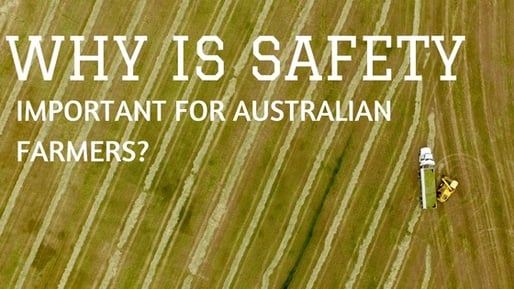
The statistics are scary...
It seems that incidents in the media are constantly being reported regarding on farm accidents resulting in serious injuries, even death. This can have lifelong implications for the business and for the loved ones of injured person, which nobody wants. We think that everyone has the right to a safe workplace.

Most people have an idea about Occupational Health and Safety, now known as Work Health Safety (WHS), and that it’s in place to keep everyone safe at work.
However, there is a negitive stigma surrounding WHS and generally, the perception of WHS is that of hefty costs for managers and owners, also that WHS is a burden on their responsibilities and for employies it seems to be a hindrance to how they do their jobs.
How is it that something that is in place to protect employers, workers, volunteers and the public alike, is regarded with little importance amongst the general agricultural community?
The regulatory bodies set in place by the Commonwealth, states and territories are responsible for enforcing WHS legislation. The legislation is a made up of the WHS Act, WHS Regulations, and various Codes of Practice.
What is our Industry Doing?
 WHS has been identified as a weakness within the agricultural sector across the country. Agricultural industry and training bodies are doing all they can in helping business and individuals understand the important role that WHS plays.
WHS has been identified as a weakness within the agricultural sector across the country. Agricultural industry and training bodies are doing all they can in helping business and individuals understand the important role that WHS plays.
In training programs, almost always there is a WHS element and industry bodies are getting together with statutory bodies to help understand the legal requirements for the agricultural sector.
A great example is “Farmers’ Guidebook to Work Health and Safety”, produced by Safe Work SA and Primary Producers SA in conjunction with Grain Producers SA, Livestock SA, South Australian Dairy Farmers Association, Horticulture Coalition, Wine Grape Council SA.
It is industry related, simple to follow and understand and provides great examples and tools.
According to Safe Work Australia there were 21 quad bike fatalities in 2015 alone!
Changing the Culture
Business owners and managers deciding to introduce changes in their policies and procedures is not a simple process and is not going to happen overnight, even if it is law and for the best interest of everyone.
There is a shopping list of reasons why this is the case. One of the biggest factors is organisational culture.
Many business owners work tirelessly in creating a culture that embraces safety and open communication. Organisational culture is a powerful tool known as a set communal beliefs, morals and methods that a group has or develops within the business.
The culture decides the way employees interact at the workplace. If WHS goes against the culture embedded in the organisation, it can make it very difficult to implement change for the better.
So where to start?
For a business owners and workers alike, whether it’s the family business, or a large business with multiple employees, you need to know your legal obligations and rights under the WHS legislation. This will help you identify what steps you then need to take in creating to improving safety systems, policies and procedures.

The following steps are a helpful place to start, but it all wont happen overnight, it is an ongoing process which needs constant attention.
- First, recognise potential hazards within the business and business operations,
- Identify the risks of each potential hazard through current knowledge,
- Observation and communicating is key with everyone that may be affected,
- Lastly, where possible, eliminate the hazards, or put procedures in place to try to avoid any potential hazards
A paper trail is the key to any processes that are put in place. Many farmers already have many practices, policies and produces in place which are known and followed, but they're just not in writing.
From plant and equipment servicing and maintenance, to hazard assessments, chemical registers and internal training.
It all should be in writing so that you and your employees are clear about how thing work in your business and what to do if something does happen to go wrong.
Ensure that workers have adequate training and certifications to perform daily tasks and operate machinery. There are many tasks that a farmer is required to perform that require external qualifications to do so, such as operating a motorbike, handling and applying chemicals, operating a forklift, electrical work to name a few.
There are many examples where external training is required to better knowledge of operations, enhance confidence in ability and improve skills sets. A great example is the agricultural programs offered through TAFE.
Keep on top of it. There are no quick-fixes for WHS compliance in the workplace, its ongoing. Constant monitoring, reviewing and training is required to ensure the workplace remains a safe, giving everyone peace of mind.
If you’re interested in learning more about what we are doing, explore our website, or contact us directly to learn more.

